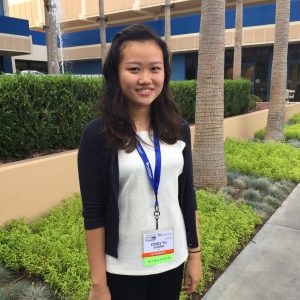
Why did you choose USC School of Pharmacy?
I chose USC because of its success and track record of developing innovative health-care leaders that strive to make an impact in the pharmacy field. USC faculty members and alumni are not only clinicians but also health-care leaders that drive positive change in our community. I knew that with this innovative and empowering environment, I would maximize my learning potential.
How have the resources and faculty available at USC helped you so far with your studies, learning, and growth?
USC faculty members are inspirational pharmacy leaders and supportive mentors to their students. Even with their busy schedules, they are always available when students need career advice, academic guidance or emotional support. When working on a project for the Gehr Fellowship over the last summer, I was mentored by Dr. Michelle Chu and Dr. Julie Dopheide. Both of them have guided me throughout my research project and demonstrated the skills and characteristics of true health-care leaders. Additionally, Dr. Susie Park and Dr. Steven Chen have provided their feedback and contributed ideas to the project. Without their support, the patient care service of my project would have not been implemented.
You participated in the Gehr Student Innovator Fellowship last summer. What was your experience like, and what was the project you worked on?
Over the last summer, I participated in the Gehr Student Innovator Fellowship with another classmate, Hao Dieu. The Gehr Family Center for Implementation Science’s mission is to better collaborate health-care systems and improve quality of care through innovative projects. Our project has two main goals: 1) to incorporate clinical pharmacy into an interdisciplinary team of physicians, occupational therapists and psychologists that provides depression care; 2) to evaluate the positive impact of pharmacists in depression care at the clinic. To me, health is the fine balance between physical and mental health; however, mental health is often neglected in primary care. I hope that the implementation of this service will improve overall the quality of care and expand the scope of practice of pharmacists in the primary care setting.
Through the fellowship, I also had an opportunity to work in an interdisciplinary team with doctors, medical staff and students from different health-care professions. Working in the Gehr Fellowship was an invaluable opportunity and one of my best experiences at USC.
Why do you think prospective students should consider USC School of Pharmacy?
USC is the premier school of opportunity as there are numerous organizations on campus. Students have the opportunity to join organizations that best suit their career interests as well as explore other career options. Also, USC has a great alumni network that establishes strong relationship with students.
At USC, I have learned from not only the faculty members but also my peers: their studying styles, presenting skills and leadership strategies. Also, whenever I am in need of support, my classmates are always there to offer me the necessary help. I cannot imagine going through pharmacy school without the support of my friends.
What are your plans and goals for after graduation?
My passion lies in both acute and ambulatory care settings, so I will use my Advanced Pharmacy Practice Experience (APPE) rotations next year to decide what field of pharmacy I will pursue. During my second year as one of Cholesterol Awareness Directors, I operated cholesterol-screening booths and provided screening to hundreds of participants. I feel fulfilled as a health-care provider when I make a positive impact for people in need. Thus, I would love to work with underserved communities after graduation.

